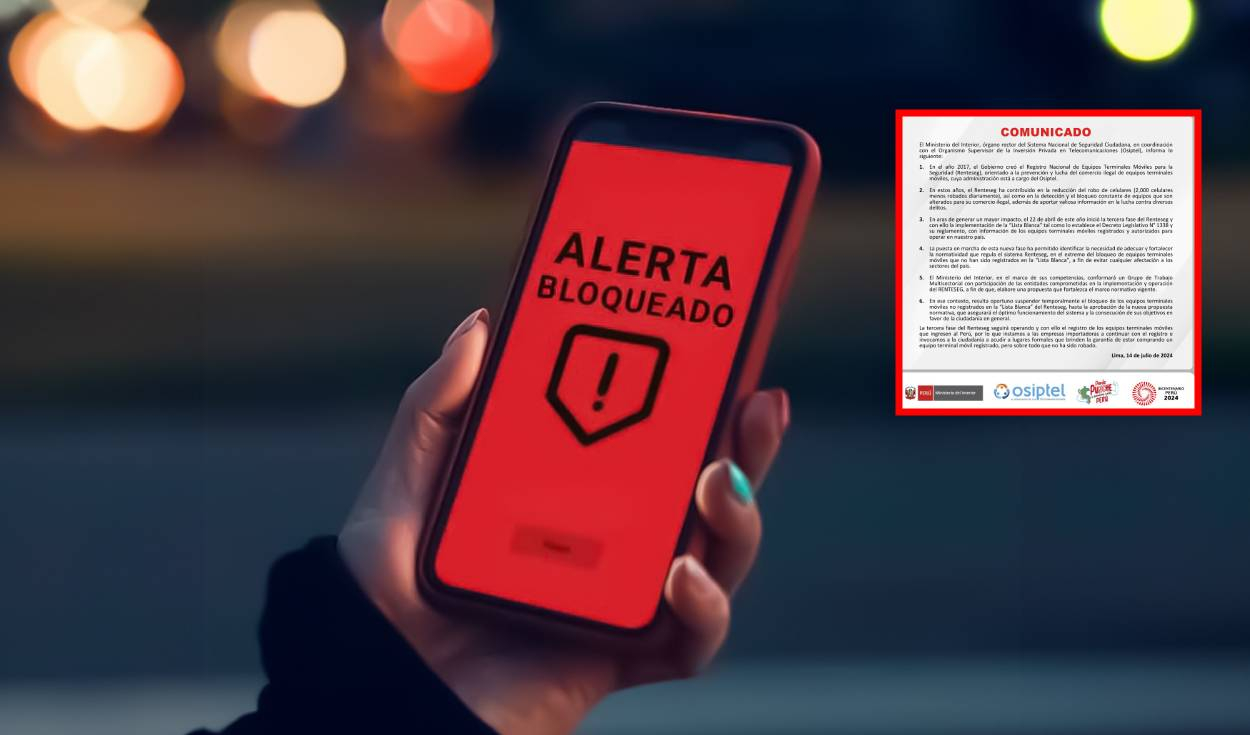
Following a series of questions from institutions and specialists, the Private Investment Supervisory Agency in Telecommunications (Osiptel) and the Ministry of the Interior (Mininter) decided to suspend the blocking of cell phones not registered on the “white list” of the National Registry of Mobile Terminal Equipment for Security (Renteseg)which was scheduled for next Monday, July 22.
According to the Mininter, since the implementation of Renteseg in 2017, the number of cases of daily theft of these mobile devices has decreased considerably and this system has provided valuable information to fight against various crimes. However, it will be necessary to wait for the formulation of a new regulatory proposal by the Multisectoral Working Group to resume this measure, which presents a series of problems.
Blocking of unregistered cell phones on the “white list” has been suspended: why?
In order to reduce the purchase of stolen or illegal cell phones, Osiptel had announced the implementation of the third phase of the National Registry of Mobile Terminal Equipment for Security (Renteseg), which consisted of blocking all mobile devices not registered by importing companies on the “white list” as of July 22.
Following this announcement, the Foreign Trade Society (Comex) and consumer rights experts questioned the effectiveness of this measure and warned of its negative implications for various sectors of the country, as it could limit ownership and free trade in cell phones.
“Between April and June, some 1.1 million devices were detected that are not on the white list and that, if it were July 22, they would be blocked because they are not on the list and they are not necessarily devices of illicit origin. So, if you extrapolate that figure, during the coming months, in the end you could find that by April 22 there will be almost 8 million cell phones that are not on the white list. We believe that there is a fairly high risk of harming consumers,” Jaime Dupuy, executive director of Comex, told Panamericana Televisión.
Faced with this wave of criticism, Osipitel’s response was not long in coming. Last Sunday, July 14, the entity, in coordination with the Ministry of the Interior, announced the temporary suspension of the blocking of cell phones not registered on the Renteseg “white list”, with the purpose of ensuring the optimal functioning of the system, while a new regulation is approved to strengthen crime prevention.
“The Ministry of the Interior, within the framework of its powers, will form a Multisectoral Working Group with the participation of the entities involved in the implementation and operation of Renteseg, in order to develop a proposal to strengthen the current regulatory framework,” they explained.
Finally, they assured that the registration of all mobile terminal equipment entering the country will continue to operate, and they urged importing companies to keep the registry updated in order to offer citizens the possibility of guaranteeing the legality and authenticity of the device they purchase.
How has cell phone blocking worked in other countries?
During his program on LR+, former congressman Jaime Delgado argued that the implementation of “white lists” is causing harm to consumer rights. Proof of this is that in other countries such as Mexico or Colombia, these types of measures did not achieve the expected results in reducing cell phone theft and a series of problems were identified that put users’ privacy at risk.
“Several countries that tried to create this white list of cell phones to combat crime have failed because they have realized that this does not work. In Mexico, there is a ruling by the Constitutional Court that declares this measure unconstitutional. In the proportionality test, what is being evaluated is that these white lists put your personal data and privacy at risk,” he explained.
In 2022, the Supreme Court of Justice of Mexico declared the creation of the National Registry of Mobile Phone Users unconstitutional, as it affected the rights to privacy, intimacy and protection of personal data. Meanwhile, in Colombia, the NGO Karisma documented a similar measure regarding the registration of IMEI in two lists. The results of this report showed that there was no significant reduction in cell phone theft, and that transparency problems in the system were noted.
Source: Larepublica
Alia is a professional author and journalist, working at 247 news agency. She writes on various topics from economy news to general interest pieces, providing readers with relevant and informative content. With years of experience, she brings a unique perspective and in-depth analysis to her work.












